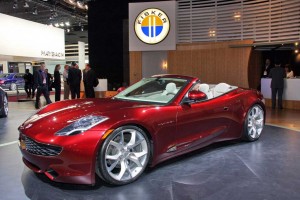
Interest in electric vehicles, like Chevy's Volt, is charging up
A new study from Maritz Automotive Research Group suggests consumer interest in new automotive technology is continuing to grow, particularly when it comes to electric vehicles.
Maritz’s Automotive Research Group has been tracking awareness of alternative fuels in its annual New Vehicle Customer Study (NVCS) since 2005, and the data show electric power growing as a primary alternative fuel among the current choices. Approximately 9 percent of consumers, who bought or leased a new vehicle in 2008, judge the electric-powered vehicle as the alternative fuel that was most appealing. As measured by the Maritz survey, the appeal of the electric vehicles has grown from 3.4 percent in 2006, to 6.6 percent in 2007 to 9.4 percent.
Another finding of the survey, which has held up in each of the past three years, was that interest is higher among those who purchased or leased a car rather than a light truck, suggesting a natural market divide could develop as more electric vehicles come on the market.
The appeal of electric vehicles stood at 4 percent in 2006, climbed to 8 percent in 2007, and currently is almost 11 percent among new car buyers and lessees. The car share of the vehicle market has grown since 2006 and is now over 50 percent of new sales. Light trucks formerly dominated vehicle sales. “With automakers struggling and renewed emphasis on reducing oil dependence, consumers are eager for innovation. Adding electric and other alternatively fueled models may help spur new growth in automotive spending,” observed Jim Mulcrone, senior manager for Maritz’ automotive research group,

Fisker Karma will bring plug-in tech to luxury buyers
Consumers ranked electric-powered vehicles third among current options such as diesel, hybrid, and seven other choices in a question that asks consumers to pick one.
The appeal of hybrid and fuel cell vehicles is rising, with hybrids up from 18 percent in 2006 to 24 percent in 2008, and fuel cells up from 11 percent in 2006 to 15 percent in 2008. “This is likely due to the wide press coverage of these alternative drivetrains over the last few years,” Mulcrone said.
The other part of the study also suggested the consumer interest in diesel power is flagging despite the extensive efforts by companies such as Volkwagen AG and Mercedes-Benz to promote the technology over the last couple of years. Interest in gas blends such as E85 and diesel has ebbed, as well, over the four years of the study with gas blends currently at 5 percent and diesel at 3 percent.
Solar power has remained flat in the 4-5 percent range; methane, propane/LPG, and biodiesel have the least interest at 2 percent or less.
The Maritz study also indicated that consumers are starting to reach definite conclusions about the various powertrain technologies. The 2008 study found that approximately one quarter, or 26 percent, of all consumers still do not know which alternative fuel is most appealing. However, the proportion of these “drivetrain undecideds” is shrinking, down from 31 percent in 2006.
One of the significant questions industry leaders have to address is how the growing interest in electrification will actually translate into consumer spending. At a recent conference, retail giant AutoNation’s CEO, Mike Jackson, noted that the vast majority of potential car buyers are now asking about hybrid vehicles, when they walk into the showroom. But barely two percent, he noted, actually drive away in a gasoline-electric vehicle.
Maritz’s NVCS has been around as a syndicated tracking study in the United States for over 30 years. The objective of the NVCS has been to provide comprehensive marketing data covering every vehicle line sold or leased in the marketplace.
